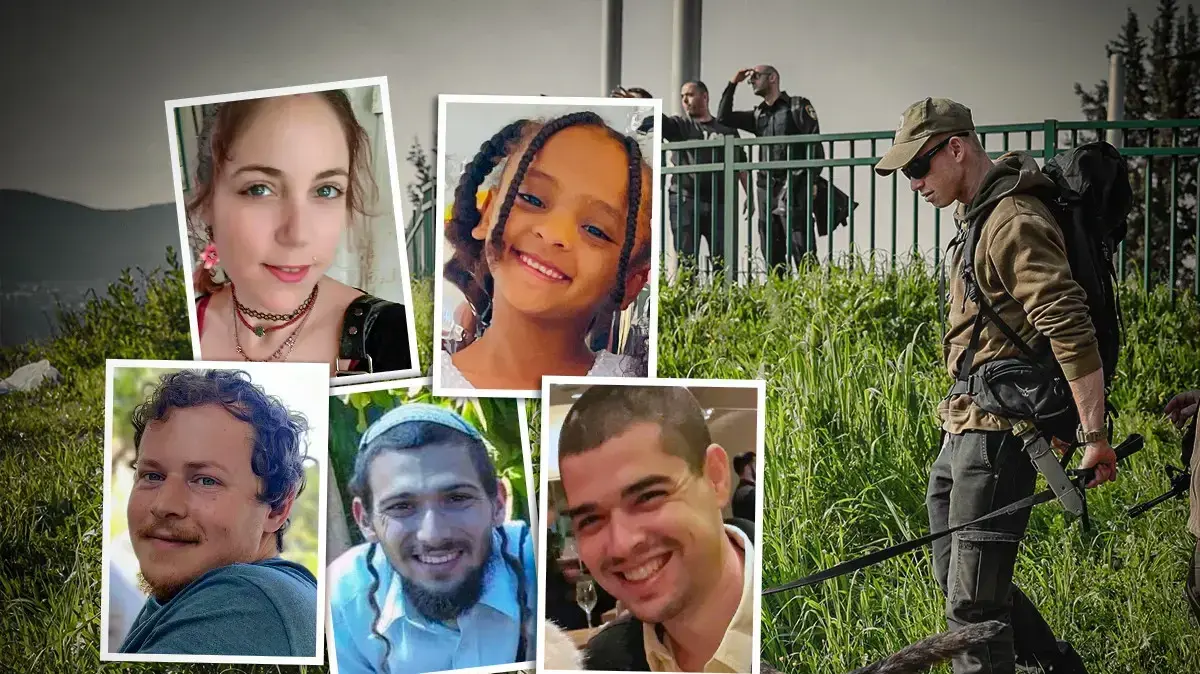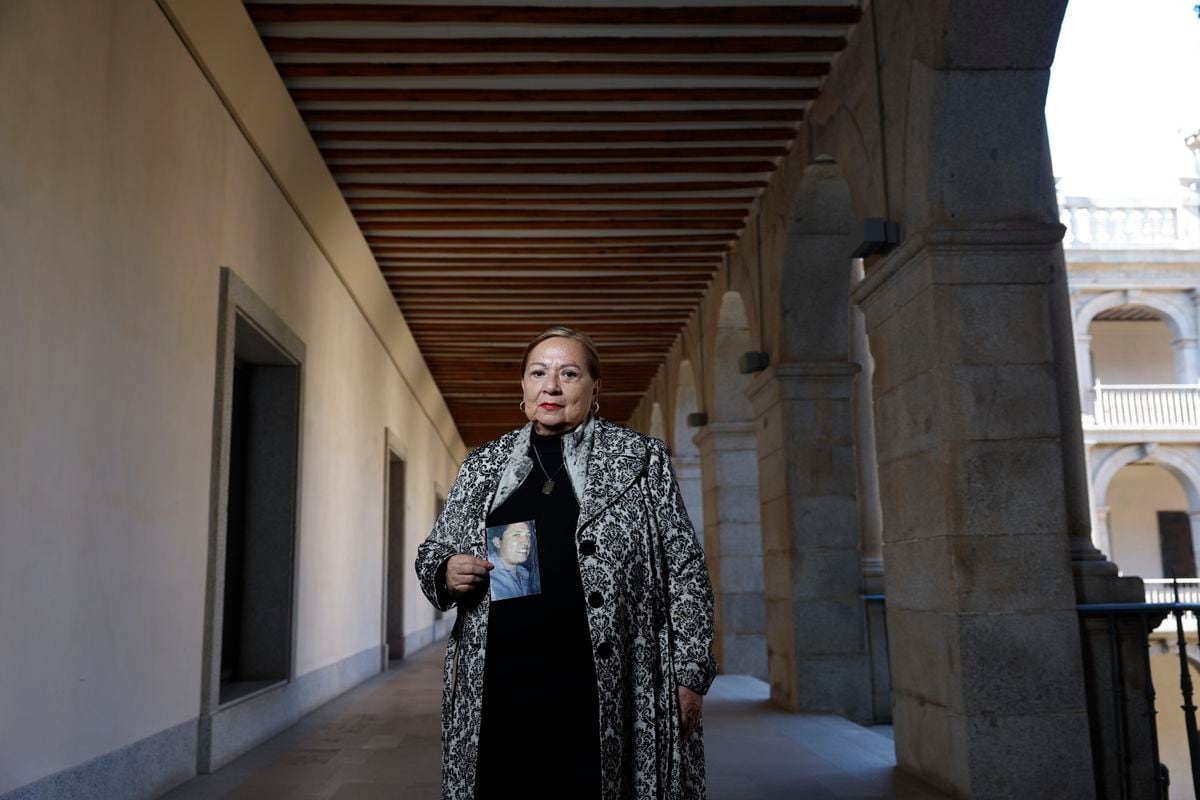In the midst of the media and political tumult caused by the deadly kidnapping of four Americans last week in Matamoros (Tamaulipas), there is a group that has raised its voice to be heard above the noise: that of the fathers and mothers who are looking for their missing American children in Mexico, those that no one has yet found.
For
Lisa Torres, mother of Roberto Franco Jr., a young man from Houston (Texas) who disappeared in 2017
on the Mexican side of the border after traveling to Monterrey, the mediatic kidnapping in Matamoros has unleashed a storm of mixed feelings.
"I was at home when I first heard about the four Americans and I was deeply outraged. Don't get me wrong, I'm very glad they found them (...) But my first emotion was feeling really angry," Torres told News. Telemundo in a text message on Friday afternoon.
Robert Franco Jr. smiles in a photo shared by his mother, Lisa Torres. Courtesy of Lisa Torres
Torres said she has high blood pressure, but not even the medications she takes could help her after learning on TikTok of the four kidnapped Americans — two of whom were later killed and two rescued and returned to the United States.
The case resonated so much with her personal history that she suffered from tachycardia for two days.
Then she shared the news with two friends, mothers like her who have been searching for their missing American children in Mexico for years:
Yairaniz Figueroa Ruiz
and
Jeannette Cerecer Ruiz
.
They spent the day writing to each other in the WhatsApp group they christened 'Mamás Guerreras'.
Later they filled Twitter with messages where they demanded answers from the authorities about the whereabouts of their children.
Noticias Telemundo interviewed six mothers and fathers looking for their
missing US citizen children in Mexico, one of them
without a trace since 2008
.
They are Lisa Torres (Texas), Yairaniz Figueroa Ruiz (New Jersey), Jeannette Cerecer Ruiz (Texas), Luz Francisca Rivera (Texas), Geovani Barrios (Tamaulipas, Mexico) and Eddy Carrillo (Baja California, Mexico).
And these are the stories of their loved ones that no one has found.
Roberto Franco Jr.
The 21-year-old mechanic Roberto Franco Jr. was traveling from Houston to Monterrey (Nuevo León) with his friend Juan Francisco Hernández Rivera, 18, when their relatives lost track of them in July 2017.
It was a trip that Franco Jr. had taken many times as a child with his father, originally from a small community in Nuevo León, a neighboring state of Tamaulipas.
Lisa Torres, her mother, did not imagine that a weekend visit to see her ex-husband's relatives would keep her son away from her until today.
Roberto Franco Jr. after fishing in Texas. Courtesy of Lisa Torres
A few days after his son's mysterious disappearance, Torres received a chilling phone call from a guy who claimed to be 'El Z-40', a fearsome Gulf Cartel boss named Miguel Treviño Morales.
The man on the phone asked them to pay a ransom in exchange for his son.
"I could not handle at that moment the terror that made me feel for what could have happened to my son," Torres said during a telephone interview.
However, the woman said that
the FBI
, which had already assigned an agent to her son's case,
dismissed the call
as false, since no evidence was ever shown that they had the young man.
Treviño Morales was arrested in 2013 on charges unrelated to the disappearance of Franco Jr. Since the FBI did not consider the call real, they did not classify Franco Jr.'s case as a kidnapping, Torres said.
She believes that had an impact on the case.
Since then, the woman says that multiple agents have been assigned to the search, making any progress difficult.
She says that sometimes no one from the agency has responded to her messages.
From right to left, Roberto Franco Jr., his mother, Lisa Torres, and his younger brother, in a photo taken in Houston in 2013. Courtesy Lisa Torres
Like many Mexican mothers looking for their missing children, Torres said she
was forced to search on her own, traveling to Mexico
.
But there, too, she did not get help from local authorities, she said.
Noticias Telemundo contacted the United States Department of State by email to inquire about the case of Roberto Franco Jr. and to address the concerns of his mother and the parents interviewed for this story.
The agency responded that it is "aware of the disappearances of US citizens in northern Mexico," that it works in coordination with local authorities and that they share information with families as much as they can.
[A girl kidnapped by her mother in 2018 is located in Mexico and returned to the US]
"If we learn that a US citizen is being held captive abroad, we work aggressively to bring them home, using all the tools at our disposal (diplomatic, intelligence and military) to secure their release," the agency responded.
Noticias Telemundo also contacted the Tamaulipas Attorney General's Office, where five of the six youths addressed in this story disappeared.
There was no immediate response.
[“It's a nightmare”: relatives of the Americans kidnapped in Mexico pray for their safe return]
"I would like to make a movement for the Americans who are missing in Mexico.
Go to the White House to protest
," said Torres, who wants more people to know about his son's case.
"Something has to happen, something has to change. And if what happened to these four Americans in Matamoros is what's going to push us forward, I have to take that chance."
Juan Francisco Hernandez Rivera
Luz Francisca Rivera was in her native Moctezuma (San Luis Potosí) in 2017 when she stopped hearing from her son, Juan Francisco Hernández Rivera, who was 18 years old at the time and lived in Houston, the city where he was born.
Juan Francisco Hernández Rivera.Luz Francisca Rivera
The last thing he knew was that he had gone with his friend Roberto Franco Jr. to Nuevo León to accompany him on his trip and also to see a friend.
But they never reached their destination
.
They got lost somewhere on the dangerous highway that leads from Tamaulipas to Nuevo León, a road with the presence of organized crime.
His son's trips by road to visit her in Mexico always worried Rivera, who asked him to visit her by truck, considering that this way he would expose himself less to the criminals who stalk the small towns of the Potosí sierra.
She remembers that he calmed her down by saying: "Calm down, mom, I'm calm, I don't owe anyone anything, I bring my vehicle, I pay for my permission to cross (the border), I bring my things safely."
[What is known about the three Hispanic women who disappeared in Mexico after crossing from Texas]
When Rivera's worst fear came true and her son stopped calling her, the young man's father went to the US consulate in Monterrey to file a complaint.
She was too broken to go.
Luz Francisca Rivera, mother of Juan Francisco Hernández Rivera.Courtesy of Luz Francisca Rivera
At the consulate they took DNA samples from the father and told him that they would follow up on his case.
"They gave us a number (...) and we were always calling. Sometimes they answered us, sometimes they didn't, that they did know but then they didn't. In other words, they didn't know anything," Rivera said during a telephone interview with Telemundo News .
Mexican authorities, he said, didn't offer many answers either.
"I have a lot of faith that my son will appear,
I have never lost faith
," Rivera said.
"May God give it back to me, give us another chance to be together, because I and my son loved each other a lot."
Joseph Rose
Joseph Rosa, a 17-year-old Puerto Rican, was in a tattoo studio called Chato's Tattoo in Reynosa (Tamaulipas) when he was last seen in June 2020.
The young man had gone to get tattooed with his father, Thomas Rosa Jr., 53 at the time, also a US citizen.
But as they left the studio,
armed men in camouflage clothing stopped them and took them away
.
They have never been seen again, the young man's mother, Yairaniz Figueroa Ruiz, told Telemundo News in a telephone interview.
Joseph Rosa and his mother, Yairaniz Figueroa Ruiz outside their home in New Jersey.Courtesy of Yairaniz Figueroa Ruiz
The kidnapping of her son and ex-husband in Mexico completely upended the life of Figueroa, who lives in New Jersey, was born in Puerto Rico and had never traveled to Mexico or had contact with the neighboring country.
Nothing had prepared her, she said, to deal alone with the bureaucracy of the Mexican justice system.
"It's something very difficult, they make you feel like you're a third-class citizen because nobody helps you, you have to do everything alone, the (
American) consulate doesn't help you
and the Mexican authorities aren't prepared," he lamented.
Like hundreds of Mexican mothers looking for their loved ones in forests, trails and ravines, Figueroa has also had to look for her son by her own means, even putting herself at risk.
"You have to go to the bottom of the gap to get some remains that are not even yours, but so that at least you already know that what is there is not your thing," he said.
Figueroa says that finding a group of mothers like Lisa Torres who suffer from something in common has been a real comfort.
"There are people who understand your pain and know what you're going through," she said.
Ernesto Garnica Jr.
Jeannette Cerecer Ruiz grew up in Matamoros (Tamaulipas) before emigrating to Texas and giving birth to her son Ernesto Garnica Jr. in Long Beach in 1994. Accustomed to the frequent shootings in her native border city, she said she always believed that if she stayed Apart from the criminals, the violence would not reach his family.
"There is a wrong mentality as a society that criminals only touch those who mess with them, you never think it will touch you," Cerecer said.
However, violence knocked on the door of his own mother's house in Matamoros on August 31, 2017, when her son Garnica was celebrating his 23rd birthday.
Jeannette Cercer Ruiz and her son Ernesto Garnica Jr. Courtesy of Jeannette Cercer Ruiz
Garnica worked at a US government shelter for migrant children in Texas.
On August 30, after leaving work, the young man traveled to Matamoros to celebrate his birthday at his maternal grandmother's house along with his friends, Cerecer said by phone.
"That day I invited my son to eat. I left work, I went to my mother's house, I saw him, I hugged him and I
never thought that this would be the last hug,
"he said.
At five in the morning, Cerecer received a call telling her that the doors of her mother's house had been found open and that her son was no longer there.
AMLO launches a low blow against the Republicans and calls them "wimps, interventionists"
March 10, 202302:00
Since then, she has dedicated her life to trying to find him.
Like other mothers, she has worked hard to put together a research portfolio of
evidence she has collected herself
.
Her son's case file already has more than 3,000 pages, she said.
Although she believes she knows who is responsible for the forced disappearance of Garnica - she preferred not to say their names for fear of reprisals - she regrets that the Tamaulipas authorities have not arrested them, despite the fact that some have arrest warrants.
"For my son Ernesto I am willing to give my life (...) But I cannot drag my other children that I love with my heart," he said.
Geovani Barrios Jr.
On April 24, 2008, more than 15 heavily armed individuals entered a supermarket of the Super 7 chain in Reynosa (Tamaulipas) and forcibly took the young Geovanni Barrios Hernández, a resident of Brownsville (Texas).
The teenager was 17 years old.
[Nine dead and 15 arrested: the cartels sow terror in a violent day in Michoacán]
His father, Giovanni Barrios, told Noticias Telemundo that he has done everything in his power to advance the investigation into his son's disappearance, including going to a US congressman after, he assured, the consulates of that country in Matamoros and Monterrey closed their doors when he asked for help.
"It was due to the intervention of an American congressman, Rubén Hinojosa [Democrat from Texas, retired since 2017] that they wanted to attend us. I told him what was happening and we went to the consulate and they apologized for not having attended us, "he said by Barrios phone.
A poster with the image of Giovanni Barrios Hernández requesting information on his whereabouts and offering a reward of up to $50,000.PGR
Like Lisa Torres and other mothers in the United States, Barrios feels that the US government's intervention in the case of the four citizens kidnapped in Matamoros contrasts with the lack of support for her son.
"They even gave a reward for information on the whereabouts of these boys. But not in the case of my son. I made the Mexican government offer one million pesos [50,000 dollars] through the Prosecutor's Office. But the US government has limited itself to say that they can't do anything. I don't understand why they make this distinction, why they abandon us," he questioned.
Eric Carrillo
At the other end of Mexico, on the Tijuana (Baja California) border, the young Erick Carrillo disappeared in June 2019 after partying with his friends in the eastern part of the city.
He was 19 years old.
Now his father, Eddy Carrillo, founder of the Todos Somos Erick Carrillo collective, has become one of the most prominent human rights defenders in northwest Mexico.
Erick Carrillo, a US citizen who disappeared in Tijuana in 2019. Courtesy Eddy Carrillo
Their fight exemplifies like few others the dangers faced by relatives who are looking for the disappeared in Mexico.
In recent years at least four people who were looking for their loved ones have been killed.
Among them, Aranza Ramos, completed in 2021 Sonora;
Javier Barajas Piña, in Guanajuato, also in 2021;
Esmeralda Gallardo, shot dead in Puebla last year, and Rosario Rodríguez Barraza, in Sinaloa, also in 2022.
"They have threatened us many times and have attacked us on at least three occasions during the searches we have carried out in the state," said Carrillo.
Among the attacks that Carrillo has suffered is a shooting in the community of Alamar.
"We had realized that there were some guys who were watching us, coming and going, then they fired three shots at us and we had to disperse," he said.
However, this father affirms that he will not give up in his attempt to do justice for his son.
This week he directed a new round of excavations in one of the properties where his son's passport was found, in the El Dorado neighborhood, in Tijuana.
"We are pressuring the Prosecutor's Office to deliver results," she said.
Since then, he says that the Mexican federal government has assigned him two agents for his security, as part of a program to protect journalists and human rights defenders.
The tip of the iceberg
The disappearance of Americans in Mexico had received little attention prior to the Matamoros kidnapping-murder, but it is by no means an isolated phenomenon.
According to data from the Mexican government, there are
532 US citizens in Mexico who have not been found.
Tamaulipas is the state where the most Americans have disappeared: about 167, according to official data.
Meanwhile, there are more than 110,000 Mexican citizens unaccounted for.
They accuse six detainees of the kidnapping and murder of Americans in Matamoros
March 11, 202301:39
In the opinion of Dr. José Andrés Sumano Rodríguez, a researcher at the Colegio de la Frontera Norte, this is due to two factors: the rapport of crime with the Government and the lack of resources of the Prosecutor's Offices and other key institutions that are overwhelmed.
“Disappearances in the state are concentrated on the border, practically half of them occur in Reynosa, Matamoros and Nuevo Laredo
.
This has to do with the question of governance of crime: it is very difficult to know where the government ends and where crime begins in Tamaulipas,” Sumano explained in a telephone interview.
"As long as the investigative capacity of the Prosecutor's Offices is not increased, there will hardly be an improvement in the issue of disappearances," he sentenced.












/cloudfront-eu-central-1.images.arcpublishing.com/prisa/KMEYMJKESBAZBE4MRBAM4TGHIQ.jpg)


